|
Algy Cluff OBE DL
formerly Grenadier Guards
In conversation with The Editor
|
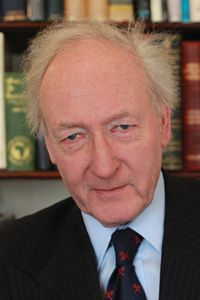 Algy Cluff OBE DL Algy Cluff OBE DL |
Several people over the last few months have suggested to me that Algy Cluff would be a good subject for an interview in The Guards Magazine. And so it proved although I could hardly claim that our meeting was an interview. Rather, it was a delightful lunch and conversation in ‘clubland’ as Algy describes it.
Traditionally, these interviews take the Household Division as the central theme, and while we did talk about the Grenadier Guards and the Army, a very important part of Algy’s life, our conversation was on a much broader canvas. This is quite simply because Algy Cluff is someone with plenty of ‘hinterland’, and there is nothing conventional or straightforward about his career. He is a risk-taker who takes on new and sometimes rather surprising ventures, and not always for commercial gain.
One of his many qualities is his ability to make friends and to seek new ones. Not necessarily school friends (by his own admission, he made few while at boarding school), or those from the Army, (of which he has many), but other interesting people along the way.
Some of these friends are the Unsung Heroes he describes in his short and delightful book of the same name, published in 2018. Like, for example, Professor RV Jones, responsible for some remarkable scientific intelligence work during the Second World War and the ‘most modest and self-effacing of men’. Algy spotted him on television in the 1980s, delivering the Royal Institution Christmas Lecture, and was ‘so enchanted by the gentle but compelling control which the Professor exercised over his audience of children’ that he ‘wrote him a fan letter’. It turned out that Reg Jones’s father had served as a sergeant major in the Grenadier Guards, something that Algy would not have known when he wrote that fan letter. They remained firm friends for the remainder of Reg Jones’ life (he died in 1997), and Algy was one of those who lobbied for him to be given a Companion of Honour in 1994. Apart from R V Jones’ wonderful book, Most Secret War, published in the early 70s, he and his enormous contribution to the war effort had been largely forgotten, and so that belated award was well deserved.
Algy Cluff has had a remarkable career. From a comfortably well-off background, he could easily have taken a predictable and gentle course in life, by pursuing his many interests, enjoying long lunches in one of his London clubs, and not concerning himself too much with the tiresome business of making money. The fact that he has managed all three, and much else besides, is a tribute to his style and character and not just his determination. He has always tried to touch life at as many points as possible, and this he has certainly done.
Algy had a happy childhood, caring much less for life at boarding school, something which ‘had the sole merit of ….enhancing’ his ‘appreciation of home life’. He was not particularly academic or sporty, and with little if any privacy in the large dormitories at his prep school, he often retreated to the solitude of the ‘well-stocked library’ where he developed a love of books and reading that has endured to this day. While serving with the Grenadiers in West Africa in the early 1960s he had six books delivered from Hatchards every month. His own library, in a converted windmill in his house overlooking the White Cliffs of Dover, is a proper gentleman’s library, reflecting his many interests in life.
The Army played an important if relatively short part of Algy’s life, although he managed to do much during his six years in uniform, serving in Africa, Cyprus, and latterly in Borneo. Enlisting in the Inns of Court Regiment in 1958, he soon concluded ‘that it was a Guards officer that I really wanted to be’. Having been accepted for a Short Service Commission in the Grenadier Guards, his first brush with the hierarchy was on his first day at Mons Barracks, where he arrived at 4am, dressed in black tie, having parked his Sunbeam Alpine in the middle of a deserted ‘car park’. An ‘infuriated Coldstream Drill Sergeant’ was not amused that morning, since this was not a car park, but the drill square! The commander of the Cadet Wing, another Coldstreamer, Sir Torquil Matheson Bt was equally unimpressed. ‘You have a car I gather ……a thoroughly bad influence on you and your fellow cadets and I am confiscating it! Give me your keys’. Algy promptly gave him the keys to the boot, not the ignition keys, and continued to use the car, no doubt to the delight of his fellow cadets, since a car at Mons in the late 1950s would have been a prized possession.
Algy Cluff’s time in the Army is laced with humour, as indeed his entire life has been, since he has an eye for the absurd and the funny, often at his expense; just another aspect of his charm. He recalls being the Duty Officer in the 1st Battalion, a task that required sleeping on a camp-bed in the Commanding Officer’s office. Awaking from his slumbers at 8am, two hours after he should have been up and about, he found himself staring up, past highly polished shoes, at the office’s daytime occupant, Lieutenant Colonel David Fraser, ‘The Razor’. ‘You imbecile… you will do a further period of Duty Officer tonight’. At around midnight, on duty, Algy received a phone call from the Charing Cross Police Station about a certain ‘Major X’ from the Battalion, who was under arrest for ‘persistently importuning a plain-clothes officer for immoral purposes’. Algy then had the uncomfortable experience of another encounter with ‘The Razor’, when he called him in the early hours to pass on this unwelcome news.
.jpg) Professor R V Jones
Professor R V Jones
|
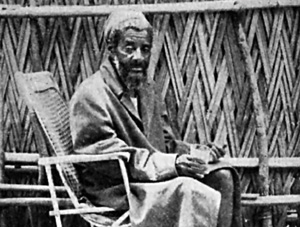 The Fon of Banso
The Fon of Banso |
In 1961, the 1st Battalion Grenadier Guards was despatched to the British Cameroons in West Africa, and so began Algy’s association with Africa that has lasted to this day. Back in 1961, the Grenadiers were there to keep the peace during a plebiscite to give the locals the choice of merging with the French Cameroons or joining Nigeria (to the surprise of many, they chose the former). The country, which seemed to produce little else but bananas, certainly had its challenges. Algy, with a small team of Guardsmen, was given the task of training the new Mobile Police Force in Jakiri ‘a hill station miles from anywhere’. It turned out that here the ‘Police were mobile in the sense that they had feet, but little else’, and so the team ‘set out to make Guardsmen of them’, which they did. An article by Drill Sergeant Jeffery, published in the Household Brigade Magazine Winter 1961/62 edition, attests to the success of the task: a tough course of skill-at-arms, field tactics, physical training and drill. On the final parade, the ‘trainees surpassed themselves in a performance that would not have disgraced Horse Guards Parade ... an ample reward for eight weeks hard work, and a new force had been born in the shape of the Mobile Police Wing’. Algy, self-effacingly, claims little credit for all of this, sitting on the verandah of his bungalow reading his books from Hatchards and listening to a wind-up gramophone sent to him by his mother, along with three records, The Sound of Music, All Aboard for Margate, and The Massed Bands of the Brigade of Guards!
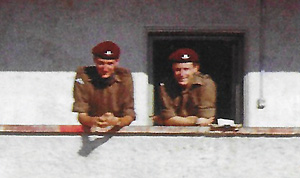 Captain Algy Cluff, Grenadier Guards and Philip Fazil, Coldstream Guards, while serving with the Guards Parachute Company, Cyprus, 1963. Captain Algy Cluff, Grenadier Guards and Philip Fazil, Coldstream Guards, while serving with the Guards Parachute Company, Cyprus, 1963.
Philip Fazil’s obituary appears on p.111 of this edition
(he later changed his name to Foxwood) |
Then one day, while on his verandah, his ‘life changed’ when a procession arrived ‘led by an elderly gentleman wearing a top hat, a mackintosh and nothing else…’. He was the ‘Fon of Banso’, the Paramount Chief of the area, and soon he and Algy became firm friends as they ‘went hunting or caroused together virtually every day’. Early in their friendship, Algy received a letter from The Fon, addressed to ‘Major General Cluff of the Grenadier Guards’ (a twenty-year-old subaltern at the time): ‘I am in the shameful position of having 120 sons and not one of them in the Grenadier Guards’. We never discover whether The Fon overcomes his shame (unlikely, since the Grenadiers were soon on their way home), although as a man with many wives, he does make Algy a generous offer that is politely declined (read Algy’s memoir to find out more!).
Back in England, Algy decided to apply for the Guards (Independent) Parachute Company, and having passed the selection and completed his parachute jumps he soon found himself in Cyprus, where he ‘experienced some unpleasant soldiering’, as the Company sought to protect the outnumbered Turkish Cypriots from the provocations of the Greeks, for whom the British Army soon became the enemy. His final tour was in Borneo.
Algy worked in and around the City for a while after he left the Army, during a period when ‘clubland’ was enjoying something of a heyday, with frequent long luncheons and dinners. Algy recalls, with affection, the St James’s Club at 106 Piccadilly, a place where the ‘club staff were as dotty as the members’, and the members were indeed an extraordinary mix of rich and impoverished, mostly charming, but with a few scoundrels and bounders among them. The club, faced with its own financial problems in the late 1970s, finally closed its doors and merged with Brooks’s. The building became a Chinese language school, and Algy shudders whenever he passes by, thinking ‘of all those ghostly Club members who were my friends’.
Following a short time as a speech-writer in New York during a US election year in the late 1960s, Algy was ready for another rather unexpected turn in his professional career: the oil business and more precisely, the North Sea. He was, surprisingly, only one of a small number of individuals who spotted the opportunities that North Sea oil could offer and had the foresight and acumen to assemble a group of potential investors to bid for the ‘blocks’ when they came onto the market. While grateful that there were few other investors in the running, he did need to demonstrate that his company, CCP North Sea Associates were serious contenders, particularly since at this stage they had no money! Hatching a brilliant and yet risky strategy ‘with the assistance of the Club claret’, Algy and his investors decided to make a cash bid for one of the initial ‘blocks’ in the knowledge (or hope) that they would be out-bid by one of the major oil companies. When the auction came, they had a few anxious moments, before Shell came in with a £10m bid, thereby ‘vindicating’ the strategy and, as Algy says, avoiding the early termination of his career in oil prospecting!
These were exciting days to be in the oil business, and for those prepared to accept the high risks, there were to be some huge returns. Algy was on the oil rig off the Scottish coast when a new field was discovered. It became known as the Buchan Field, after the nearest landfall but for Algy it was a tribute to John Buchan, his favourite author as a child. He later formed Cluff Oil from his investment in CCP and has continued to be active in the oil business and in other mining ventures around the world, returning to the North Sea in 2014.
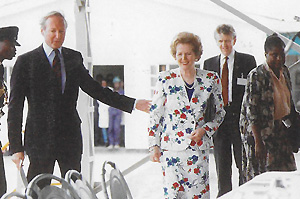 Opening the Freda Rebecca Gold Mine in Ghana. Algy Cluff with the Prime Minister, Margaret Thatcher, and Charles Powell, her private secretary
Opening the Freda Rebecca Gold Mine in Ghana. Algy Cluff with the Prime Minister, Margaret Thatcher, and Charles Powell, her private secretary
|
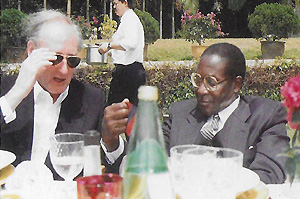 Algy Cluff with President Robert Mugabe in the garden of David Tang’s house in Hong Kong, one of several occasions that they met. In 1994, Algy hosted Robert Mugabe in Scotland, who, observing a piper, turned to Algy’s wife Blondel and said ‘Unless I am mistaken, this gentleman has an ostrich feather on his head? Under his arm he is squeezing the gut of a dead animal? And he is wearing a skirt?
And they call us primitive!’
Algy Cluff with President Robert Mugabe in the garden of David Tang’s house in Hong Kong, one of several occasions that they met. In 1994, Algy hosted Robert Mugabe in Scotland, who, observing a piper, turned to Algy’s wife Blondel and said ‘Unless I am mistaken, this gentleman has an ostrich feather on his head? Under his arm he is squeezing the gut of a dead animal? And he is wearing a skirt?
And they call us primitive!’ |
In 1980, Algy bought The Spectator from Henry Keswick. It seemed a rather quixotic endeavour since the magazine was consistently making a loss, but Algy was optimistic. The share price of Cluff Oil was looking good and, at 40 years of age, Algy was ‘anxious to continue touching life at as many points as I could sensibly do’. His Editor was Alexander Chancellor, and as proprietor, Algy assumed that his role ‘should involve the determination of policy’, however he soon discovered that he ‘could not have been more wrong’. A memorandum to the Editor proposing more coverage of the Far East was printed in the magazine ‘as if it were from a reader!’ He had a friend whose office was opposite The Spectator office, and he would often receive a call at midday to inform him that his Editor had arrived but that half an hour later he and his team had ‘adjourned for a well-earned lunch at the Duke of York’s Public House’. Then another call at 4pm to report that most of the team were back but were now making their way home.
Despite this inauspicious start, amusingly recounted by Algy in his memoir Get On With It, he persevered with The Spectator. He appointed Charles Moore as Editor in 1984, the circulation increased, and the magazine was on the way to making a profit. In 1985 Algy sold the magazine to Fairfax, an Australian newspaper group, concluding that the days when a magazine like The Spectator could be owned by an individual had passed. He was therefore both ‘surprised and delighted’ when the new owners asked him to stay on as Chairman, a role he happily filled for the next 20 years. During that time, he worked closely with several Editors, including Dominic Lawson and latterly Boris Johnson, who was very thankful for not being sacked (one recalls a few occasions when he might have been) ….. because he had a mortgage to pay!
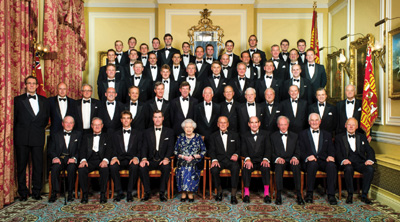 The Ensigns’ dinner with HM The Queen, The Cavalry & Guards Club, 21st October 2013. 51 former Ensigns who have carried the Colour on the Queen’s Birthday Parade during Her Majesty’s reign were present. The Duke of Edinburgh was a guest, and the Major General was also present. Algy Cluff, who carried the Colour in 1960, is in the front row, third from the right. The Ensigns’ dinner with HM The Queen, The Cavalry & Guards Club, 21st October 2013. 51 former Ensigns who have carried the Colour on the Queen’s Birthday Parade during Her Majesty’s reign were present. The Duke of Edinburgh was a guest, and the Major General was also present. Algy Cluff, who carried the Colour in 1960, is in the front row, third from the right. |
More recently, along with his many other interests, Algy has become involved in a project which is particularly close to his heart, The Remembrance Trust, of which he is Chairman and Founder. The objectives of this charity are simple and compelling, to identify and, where possible, restore the monuments and graves of British and Commonwealth military personnel who died before the outbreak of the First World War in 1914, since there ‘is no one organisation that takes responsibility for graves and memorials before this date’.
While The Commonwealth War Graves Commission takes care of graves from 1914 onwards, there are many graves and monuments from earlier wars that are in poor condition and in need of repair. The Trust has a timeline stretching from 1700 to 1904, a period when soldiers of the British Empire fought in many parts of the world ‘some willingly and for good causes, others less so’, and often with their families suffering many of the hardships and sometimes the same fates as their husbands and fathers. They all deserve to be honoured and their sacrifices remembered, and this is the objective of The Remembrance Trust. Recently, for example, The Trust has restored two Coldstream Guards’ graves, of Guardsmen who died at The Battle of Bayonne in 1814.
The graves of two Coldstream Guardsmen who died at
The Battle of Bayonne in 1814:
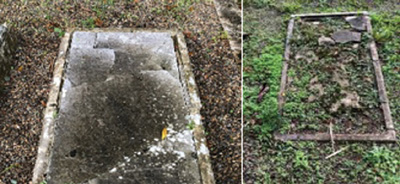
Before
|
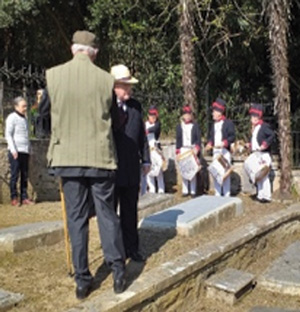 After
After |
The Trust has taken on a herculean task, as there are surely many graves around the world that have been lost and forgotten and in need of attention. Readers can discover more at www.theremembrancetrust.com and can also pass on information about any lost graves they might discover in their travels by contacting The Trust at remembrancetrust@gmail.com.
My lunch with Algy Cluff was now ending, and it had indeed been a memorable occasion for me, on a rather bleak day in mid-January. I had very much enjoyed our conversation, and it was certainly not an interview, since Algy is as good a listener as he is a talker; a rare quality, particularly for one who has so many interesting things to say.
Get On With It is an exceptionally good title for a memoir, since Algy’s life cracks along at a pace, and still does. The book is remarkable in another sense, since it packs a huge amount into just 183 modestly sized pages. Algy’s stories and his meetings with so many people, including Margaret Thatcher and Robert Mugabe (to name just two), are always revealing and often amusing; anyone who has read and enjoyed this book will be eagerly awaiting more from Algy’s pen. For all his achievements, touching life at as many points, he writes in a light and charming style, and with humility and modesty; the laugh often seems to be on him. His next book, Off the Cluff, will be published later this year, and it will be another enjoyable read.
In 2019, as Algy approached his 79th birthday, he decided to retire from the oil business, but as one newspaper described it, he was soon back at work: ‘Algy Cluff’s retirement lasts three hours as he launches new Africa-based oil venture with City investor Michael Spencer’. And as I was tottering off down Jermyn Street, to check out the January sales, Algy was on his way back to his office.
|
|

 Algy Cluff OBE DL
Algy Cluff OBE DL.jpg)




 The Ensigns’ dinner with HM The Queen, The Cavalry & Guards Club, 21st October 2013. 51 former Ensigns who have carried the Colour on the Queen’s Birthday Parade during Her Majesty’s reign were present. The Duke of Edinburgh was a guest, and the Major General was also present. Algy Cluff, who carried the Colour in 1960, is in the front row, third from the right.
The Ensigns’ dinner with HM The Queen, The Cavalry & Guards Club, 21st October 2013. 51 former Ensigns who have carried the Colour on the Queen’s Birthday Parade during Her Majesty’s reign were present. The Duke of Edinburgh was a guest, and the Major General was also present. Algy Cluff, who carried the Colour in 1960, is in the front row, third from the right. 
